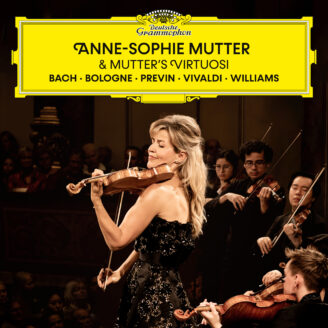Making an early appearance in this Beethoven anniversary year is a very special new album from Deutsche Grammophon. It couples the composer’s Seventh Symphony, op.92 with the Triple Concerto for piano, violin and cello, op.56, the latter work featuring three of today’s most renowned classical artists and Beethoven interpreters – Anne-Sophie Mutter, Yo-Yo Ma and Daniel Barenboim. The acclaimed West-Eastern Divan Orchestra, meanwhile, gives vibrant, richly nuanced performances of two works central to the 2020 celebrations.
The recordings were made at concerts held in Buenos Aires and Berlin – in July and October 2019 respectively – to mark the West-Eastern Divan’s 20th birthday. Co-founded by Daniel Barenboim in 1999, the orchestra now stands as a symbol of multicultural understanding, as well as being the brave realisation of a long-held dream. A fascinating microcosm of a society of enormous diversity, it is proof positive that working together for a shared goal can break down barriers and lead to reconciliation.
Daniel Barenboim considers Beethoven, a confirmed humanist, to have been probably the first truly unconventional composer: “He couldn’t care less about what people thought.” He also underlines the real physicality and dedication Beethoven demands from his players: “He forces you to go to the edge, to the precipice and then the abyss. That takes a tremendous amount of courage.”
With its existential profundity and ability to speak to all of humanity, Beethoven’s music remains as timelessly compelling and universally relevant as the day it was written. As Anne-Sophie Mutter observes, he understood how important it was for all of us to stand up for our fellow men: “The idea that we should live in a brother- and sisterhood is, for me, his major achievement ... That’s what makes him a messenger from the past pointing the way to a better future.”
Both works recorded for this album reflect that life-affirming message. The Seventh Symphony is famous for its joyful, dance-like character, with lilting rhythms pervading almost the entire work. The Triple Concerto, too, has a special place in Beethoven’s output, its sophisticated idiom and architecture revealing both his sense of humour and his revolutionary spirit. As Yo-Yo Ma notes, “The constant invention is so surprising, and it’s so celebratory, so positive. The second movement is noble and open, but the first and last movements are just joyous!” The clearly delineated solo parts give the work a chamber-music feel, and the intimate, expressive readings achieved by Mutter, Barenboim and Ma will undoubtedly leave listeners spellbound.
February 14th, 2020
Please accept cookies to view YouTube player. Watch on YouTube.


